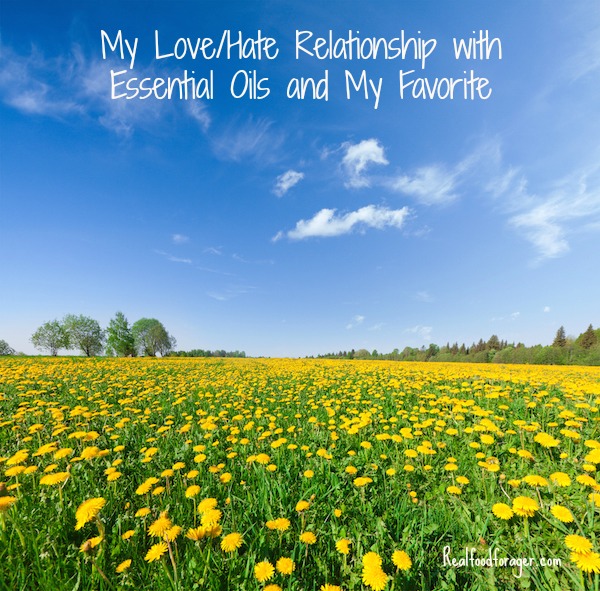Essential oils can be used for many home remedies, personal care and cleaning products in place of pharmaceuticals and commercial products that contain toxic substances. However, since I am chemically sensitive, it is even a challenge to find the oils I can tolerate.
I absolutely hate lavender. I know it is one of the most commonly used and loved oils.
But even a mild sniff of lavender cuts through my sinuses and even when lavender is blended, I can still smell it a mile away.
When I first started with essential oils I ordered a kit with lots of different oils. I was very upset when I realized I could not tolerate more than half of them.
And even the ones I do tolerate, I don’t like having a fragrance around me all the time.
My All Time Favorite Essential Oil
I’ll tell you my favorite – it is ylang ylang (phonetically pronounced ee-lang ee-lang). I find the fragrance very mild, sweet and bright and it really impacts my outlook on the day.
I can take a sniff right from the bottle and immediately feel relaxation. I like to rub a drop on the bottom of my feet before bed and this works better (for me) than lavender for a good night’s sleep.
The essential oil of ylang-ylang is extracted by steam distillation of fresh flowers of the ylang-ylang tree, (Cananga Odorata). It is commonly found in the rain forests of Asian and South Pacific Islands such as, Indonesia, Philippines, Java, Sumatra, Comoro and Polynesia.
Ylang ylang has a slightly flora fragrance, which I find very bright and uplifting! When I smell ylang ylang, it brings me to a mountain top meadow of flowers on a warm sunny day.
Sounds corny, but the fragrance of an essential oil can have a very powerful effect on the mind and mood.
Health Benefits of Ylang Ylang
The main health benefits involve the nervous system, as it is an antidepressant, hypotensive, nervine and sedative substance.
This 2009 review of rodent studies show the anti-anxiety effects of essential oils.
Importantly, this 2011 review of human studies show a positive outcome using aromatherapy. The researchers concluded,
It is recommended that aromatherapy could be applied as a complementary therapy for people with anxiety symptoms. Further studies with better quality on methodology should be conducted to identify its clinical effects and the underlying biologic mechanisms.
Antidepressant – Ylang ylang helps with anxiety, depression, stress and sadness. As I explained above, the brightening effect it has on me can be extraordinary.
Hypotensive – Ylang ylang can help lower blood pressure. It is certainly something to try, perhaps along with other blood pressure lowering holistic approaches. It is well known that pharmaceuticals for lowering blood pressure can have strong adverse effects for some people.
Sedative – Ylang ylang has a sedative, relaxing and calming effect on anxiety and chronic stress. It can certainly be used during acute bouts of anxiety.
Nervine – Ylang ylang strengthens the nervous system and may even help repair any damage to the nerve tissue.
There are other benefits to ylang ylang, such as antiseborrhoeic, antiseptic, aphrodisiac effects, but I wanted to focus on the calming effect it has, because that is my own personal experience with it.
How To Use Ylang Ylang for Calming
- Make an epsom salt bath using 1 cup of epsom salt or magnesium flakes in a standard tub letting it dissolve under the running water. And a few drops of Ylang Ylang for a totally relaxing experience.
- Make a massage oil with it using coconut oil or some other carrier oil and massage into the shoulders or back.
- Apply a drop into the feet over your regular foot cream for a better night sleep.
- Put a tiny drop on your wrists for a constant scent.
- Add to your diffuser.
Are you as Fascinated About Herbs and Essential Oils as I Am?
Well, look no further, because it’s here!
Introducing The Herbs and Essential Oils Super Bundle!
For six days only, (Wednesday, May 17 – Monday, May 22) everything you need (and then some) is in one fabulous package, for the most affordable price ever – just 29.97!
This year’s edition of the Herbs and Essential Oils Super Bundle includes 16 ebooks and printables and 10 full eCourses!
These top-quality resources cover everything you need to give you the skills and confidence to start using natural remedies in your home.
You’ll get a complete library to help you:
- Rebuild your medicine cabinet with natural remedies
- Create beauty and skincare products without harmful ingredients
- Treat your digestive complaints, pain, colds, and flus with everything in your medicine cabinet
- Preserve, harvest, and cook with healing herbs
- Discover the cancer-sugar connection and take back control of your health
- Boost your mood, heat up the romance, and increase mental clarity with essential oil blends
- Liven up your meals and get major health benefits by using the right herbs
- and so much more!
Seriously, just two items that I am interested in – the Cancer, Nutrition & Natural Healing eCourse by Sayer Ji, a $39.00 value and the The Thinking Parent’s Guide to Natural Remedies by Kresha Faber, a $17.99 value, together are way more than the super low price of The Herbs and Essential Oils Super Bundle! and you will get so much more!
Check out what’s in The Herbs and Essential Oils Super Bundle!
Safety Considerations
The field of essential oils is an emerging field of natural remedies. That said, it’s important to note that there is virtually no research out there regarding how essential oils interact with drugs in human clinical trials. What this means is that no one really knows how essential oils will interact with medications or your specific body and health conditions.
Let common sense be your guide. Still, be sure to maintain proper dilutions, and general safety considerations still apply. As always, discontinue use if any adverse reactions occur and consult your physician immediately.
Please see my disclaimer here.











